- Home
- Barry Unsworth
The Ruby In Her Navel Page 35
The Ruby In Her Navel Read online
Page 35
I did not speak of Yusuf Ibn Mansur and our talks together concerning this mission of mine to Potenza. I did not utter his name at all. Nor did I speak of my discovery of the secret compartment and my reading of the documents kept there, with their strong suggestion that Conrad Hohenstaufen was the inspirer of this plot and perhaps also the paymaster. Even if it were true that my betrayal of Yusuf was not common knowledge, it was beyond all doubt that this corpulent and pale-faced man who was the King's Chief Justiciar, who listened so impassively to my words, knew the traitor's part I had played. He would have been there with those who tried Yusuf, if trial it could be called; it would have been he who delivered the judgement, appointed the punishment, saw it carried out. But there was an authority greater than his in the Kingdom of Sicily, one that made use of his voice and his eyes, one who would require to be told that all had gone well…
For the rest, I was as full and frank as I knew how to be, judging it the safer course. Spaventa would be put to the question and he would give names, mine among others. Attempting to conceal that I had carried the purse to him would have been far more dangerous than admitting it. I had acted in good faith, I laid emphasis on that. And it was I, after all, who had frustrated this malignant design.
I was kept under guard for a good while afterwards, though why so long I do not know – perhaps they had found others to question. During the time I was held there King Roger, from his viewing place in the north transept, celebrated the Day of Christ's Transfiguration, and there was no trace on the wall opposite of anything that might offend his sight.
XXVIII
I never saw Spaventa again. He died in the hands of his questioners, but not before yielding names. Atenulf and Wilfred were arrested and racked in their turn, as also was the Lombard mosaic-worker who had set the scaffolding in place. Gerbert succeeded in escaping to Swabia, where he was well-received and later became Father Confessor to Prince Otto.
These things I learned only later. I was still keeping to my rooms. I wanted no company, the feelings of weakness and illness were increasing on me.
Two days later the royal summons came, brought to me in person by Stephen Fitzherbert, Steward of the King's Household, which was already a sign that I was well-viewed, as was also Fitzherbert's extreme affability towards me. He was a weather-vane of a man, always turning in the breeze of the King's favour. Had the occasion been different he would no doubt have sneered at the poverty of my dwelling.
He waited below while I made ready. I had neglected to shave for a good many days now and had a short beard, which I decided to keep as not unbecoming – vanity persisted in me despite my wretchedness. Now it was only a question of choosing clothes that were not presumptuous in finery, but sober and of good quality, not such a difficult choice but one that seemed heavy to me that day. The uncertainty of balance I had felt on learning the manner of Yusuf's death still visited me from time to time, as did the sensation of nausea I had experienced then. I was prey to sudden chills that made me shiver, even in that August weather, and my eyes were giving me trouble, I had a sense of some obtrusion at the outer edges of my vision, there was sometimes a strange distortion, with things stretching or contracting slightly, changing shape.
There was more to my reluctance than this. There were clothes in my chest that I could hardly bear to look at, let alone put on, those I had worn on my first visit to Favara, for example. And anything in which I had once taken pride bore in its folds the sound of Yusuf's voice and the look of his face when he complimented me on my appearance. Finally I chose a suit of dark brown velvet, unadorned with tassels or brocade, one I had possessed for a good while and was gone a little out of fashion, with pads on the shoulders and a waist that was gathered in.
Fitzherbert rode with me, talking all the while in his high voice, interspersing Sicilian phrases with his French – it was the practice now at court to use Sicilian in this way, for a colloquial effect. He was full of compliments for me. It seemed that my disabling of Spaventa had not been the fear-stricken blundering that I remembered, but intrepid and heroic and extraordinarily quick-witted and prompt. "To see the threat that no other saw, to make that leap of mind, it was brilliant, everybody says so," he gushed. "And then to confront him in that manner, single-handed, and wrestle with him and throw him down, such courage and readiness, everybody says so."
By everybody he meant those at court who had learned of it. But I was glad for his talking in this strain, it kept him from reference to Yusuf. I said little in reply, but he did not mind this, being highly content with the sound of his own voice. When we reached the palace I was delivered to the care of the Household Guard, who escorted me to an anteroom in the royal apartments, and here I waited some while. It was Giovanni dei Segni, the King's notary and close adviser, who came for me, and he too smiled upon me and his smile was blurred, as if seen under water, and Yusuf's death was in it. I was led, with the guards still flanking me, through the portals of the audience chamber, and I saw the seated figure in the high chair on the dais at the far end of the long room, saw the gleam of the circlet round his head, the scarlet and gold of his mantle.
I stopped in the doorway and made a reverence that brought my forehead not far above the marble of the floor. And I heard the King's voice, loud, with some hoarseness in it: "Let him come forward alone."
He spoke in French but it was not the language of my fathers, it had the accents of the south. The guards fell back from me, but still for some moments I remained where I was, body inclined and eyes cast down.
"Come forward, Thurstan Beauchamp." The voice was softer now. "Come forward here to me."
I walked forward and rarely have I felt so alone as on that walk, as if I were in some desert place, under a vast and empty sky. I stood at the foot of the steps and still I did not look at him, but glanced beyond to the figures behind him and saw Gilbert of Bolsavo there, Master Constable Designate, whom I had last seen riding behind the King into the castle of Potenza. There were two with him, very splendid in the livery of his retainers, and one of these bore a sheathed sword laid flat in his gloved hands.
"Closer yet," the voice said.
It was not awe that kept my gaze from his face, though he would have taken it for such. I think it was a kind of fear, not of his person or his power, but of finding confirmed the misgivings I harboured in my heart. The plans that had been laid for my entrapment and my coercion into treachery, these he would not know – they were the devices of the spiders. But Yusuf's death, the manner of it and the haste, these things he must surely know, just as he must know the long and faithful service Yusuf had given him. With his full knowledge and consent this thing had been done. For a brief while, as I stood there below him, my soul was placed in peril by the Evil One, I was tempted to set all down to the mystery of the King's power, to restore him, serene in majesty, to his silver barge, gliding over the dark waters below which the creatures feasted and fought. Perhaps it was to save myself from this surrender of reason that I looked up to his face now, saw it for a moment only, sharp-eyed and fleshy below the coronet, a moment only but there was time enough to see the marks that the anguish of fear and pride had made, time enough for me to know, finally and for ever, that there had never been a silver barge to keep afloat, that this my King to whom I had vowed my service, was a man with a face like other faces I had seen, the face of one who lived with us in the dark water, among the other creatures feasting and fighting there. And in that same moment, as this knowledge came to me, my sight failed, the face of Roger of Hauteville slipped and distended and lost its form and I lowered my eyes to the glow of the ruby that hung on his breast.
"My beloved subject, up here to me," he said, and he raised a hand and beckoned.
I mounted the steps until I was immediately below him. Here I knelt – it was too close for standing. How often I had dreamed of kneeling thus before him, to hear at last his praise for my devotion and feel my soul absolved by this praise for all the things I had said and done in
his service.
"We thank you from a full heart," the voice said above me. "We have been told of your courage and your quickness of mind. If all his subjects were of your temper, the King would need have no fear of foes." His voice had broken slightly on these last words and when he spoke again it was more quickly and warmly. "Thou hast earned the King's gratitude and he will not forget."
I had not raised my eyes again to his face after that slipping and distortion. I was looking at his hands, which were broad in the palm and had black hair on the knuckles. I saw them make a very quick and sudden movement upwards, saw them go behind his neck to the silver chain that held the ruby. He leaned forward and placed the pendant round my neck and I felt the touch of his hands as he fastened it. His face was close to my own and there was a sweetness to his breath like that which comes from keeping sugared comfits in the mouth.
"You will learn what it means, the King's gratitude," he said, in tones more sonorous and measured now. "This that I place round your neck is but a token."
I would have risen, but he stayed me with a gesture. "We hear that you have long aspired to knighthood, to join the order that belongs to you by birth. By the power invested in me, I name you knight."
A moment later I felt the buffet of the colce on the side of my head, a light blow but it sent a pain through me. "Rise," he said, "Sir Thurstan Beauchamp, be brave and faithful in my service, that God may love thee."
A wave of heat came over me. I felt the blood flush in my face and I heard my voice replying with the words I had uttered so many times within myself in the days when I still thought to be knighted: "So shall I, with God's help."
Gilbert came forward and he was carrying the sword, still sheathed, and a belt. He came to a stop at the foot of the steps. I went down to him and he unsheathed the sword and tendered it to me, holding the hilt towards me. I took it and kissed the hilt and he returned the sword to its sheath and the King left his chair and came down to me, descended to my level, and girded me with the sword. "God go with you, sir knight," he said. "I have bespoken a fief for you in Calabria with forest and ploughland." His face was not steady to my sight, the mouth and jaw contracted strangely and all that was in my mind was a fear of staggering and the anguish of a question: how had he known that knighthood had been my dearest wish? It was the same question that had beset me hearing words almost the same from the mouth of Bertrand of Bonneval. I had buried my disappointment deep. I had spoken of to no one, not for many years. Only she had known, Alicia. That night in the courtyard of the Hospitallers all had come forth from me in the warmth and sympathy – as it seemed – of her presence. In recounting my disappointment I had thought to be resuming my hopes…
This man, who had just blessed me and girded me with the sword, had learned of these hopes of mine. In gratitude he would have enquired. The purveyor of spectacles who had saved his life… They who had trapped me were the same who had answered his questions. It must be so; theirs was the only knowledge of it. He would not know of this entrapment. It was beneath his notice, who was concerned with threats of invasion, with the loss of his colonies in North Africa, the fall of his revenues from the sale of wheat, the continued refusal of the Pope to recognise his kingship. I was too low for his knowledge. But Yusuf's case was otherwise, Yusuf had been chosen. The perfect victim, high-born, wealthy, a distinguished figure among the Moslems. The crime had been devised, the mode of punishment studied…
The certainty of this came to me like an access of sickness – I shivered with it. How and in what order I retired, I do not know. I remember retreating with bows, I remember being again flanked by guards. The return to my house is a page on which memory has left no marks. When I dismounted I could hardly walk in a straight line.
XXIX
I had strength enough left to tell Pietro to look after my horse, get up the stairs, put the ruby in my strongbox and take off my outer clothes.
The sword I let fall to the floor. My head was throbbing and when I lay down and looked up to the ceiling it seemed to tilt, as if I had drunk too much. Almost at once I fell into a state that was between sleep and waking. Shallow dreams came to me, too shallow for sleep, glimpsed in the air above my head or in the corners of the room, never seen for long and never distinctly, sometimes dissolving in mist, sometimes sliding away. Yusuf came and he was in shining white like Christ on the Day of Transfiguration and he was trying to explain something but when I interrupted him to ask his pardon his face was lost to me and I saw that his robe was dark with blood. Muhammed came, he too in white. He had no face but I knew him by the strangler's cord he held in his hands, gloved hands, he held it like an offering, like a sword. It was Alboino holding out a paper to me, I saw his sorrowing face as he spoke of the daily wrong, and I saw Bertrand's, pleasurable and full of care, as it had been when he cut out the hart's tongue.
How long I lay like this I do not know. Darkness gathered round me and the light of another day. Someone gave me to drink and he had the face and voice of Stefanos. Then the room was dark again and I woke in this darkness because of the smell of sweetness that was pervading the room, which I thought at first was caused by the lilies that lay on the floor, but it came from some sugary thing that is dissolved in the mouth and breathed out and I knew the King was breathing in this room though I could see nothing, he was beckoning me to rise, to mount towards him, the water was gathering here below, lapping round me, but I could not see the way to the steps, the water rose around me, I was struggling in it, others too, I saw their dim forms twisting in the water and I looked up and saw the silver of the barge far above me and rose to it but when my head broke the surface there was nothing there, only reflections of light that stretched and shrank and a fire burning in the distance. Then all was quiet and I was walking among fields that I knew and they were lying under a thick cover of snow, fresh and shining and unmarked, such as I remembered seeing in my boyhood in the north of England.
This snow was cool, I felt it on my forehead and chest. I opened my eyes a very little, to see sunlight in the room and Nesrin's face above me, and it was her real face, it did not slide away. She held a bowl and a cloth and just for a moment my eyes were able to dwell on her face without her knowing it, because she was looking down at my chest where she was about to lay the cloth. And this, her not knowing, gave a look of calm to her face, in its ministering purpose, that was new to me, making her seem, in my weakened state, still feverish as I was, a person at once closely familiar and entirely strange. It will be with me always, this presence of hers when I awoke, her care as she held the bowl, her mouth that could sometimes seem bitter softened with this care. Then she saw my look was on her and her expression changed, the eyes narrowed a little, something of a smile came to her face.
"If you open your eyes wide, you think I fly away? All the night you talked to ghosts but I am not one."
But I closed my eyes instead, perhaps indeed not quite believing, wanting to keep this face of hers locked safe. "How did you come here?"
I said.
"I come up the stairs, like any person."
"No, I mean…" What I meant I did not know. Her presence there was like a miracle to me.
"He tried to stop me, he below who keeps the door."
"Pietro."
"He said you are sick, you want to see no one. I tell him I know better what you want. I tell him stand aside."
This made a sort of laughter within me, or perhaps only a prospect of laughter, remembering the night we had first met and the jesting of the others and her serious face in the firelight. I was naked under the sheet, I realised now. "You took off my shirt," I said.
"I take off everything. You are burning hot, like a fire inside you. You are sweating all over, you are talking to spirits. I need to bathe you, to make the fever less. How can I do that if you have the shirt? You fight with me, you think I try to rob you."
She had found me ugly and disordered, among tumbled bedclothes, the sweat of sickness lying on me. "You will stay
?" I said. "You will not go?" If she promised this I knew I could sleep.
"How strange man you are. You think Nesrin leaves you when you are sick?"
"The water feels good. It has a good smell also. It scents the room.
What is in it?"
She was saying something in reply but I was asleep before I could catch the words. I lay in slumber all through the afternoon, without a dream that could wake me. When I opened my eyes the lamp was lit and she was sitting on cushions on the floor near the bed and I thought she must have got these cushions from Caterina, as they had not been in the room before. Her head was lowered over her work – she was joining strands of wool together, over and under, with a hooked piece of wood, and the movements of her hands were very rapid and sure.
I felt weak but my head was clear and there was no impediment to my sight. I looked at Nesrin as she sat there intent on her work, her long hair tied back with a single ribbon to keep it from her eyes. She was wearing loose pantaloons of a kind Arab women sometimes wore, and she sat cross-legged. I would have liked to linger in this watching her, her quiet presence gave me such heart, but I was afraid she might surprise me in it and think me one who spied, so I spoke a greeting to her, and she glanced towards me and smiled, but in a way that seemed half-startled, as if my words had interrupted some secret thought.

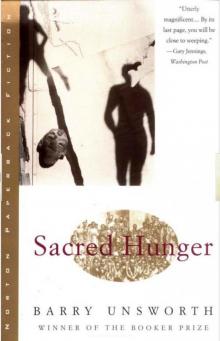 Sacred Hunger
Sacred Hunger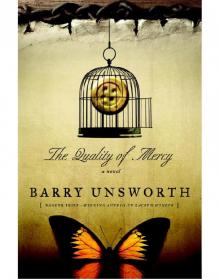 The Quality of Mercy: A Novel
The Quality of Mercy: A Novel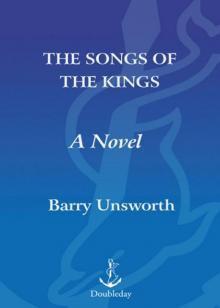 The Songs of the Kings: A Novel
The Songs of the Kings: A Novel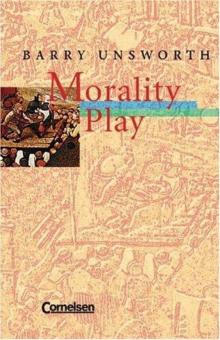 Morality Play. Mit Materialien. (Lernmaterialien)
Morality Play. Mit Materialien. (Lernmaterialien)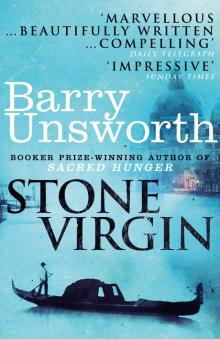 Stone Virgin
Stone Virgin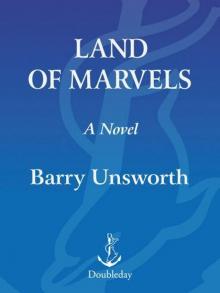 Land of Marvels
Land of Marvels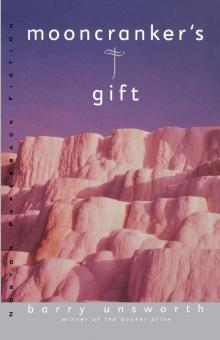 Mooncranker's Gift
Mooncranker's Gift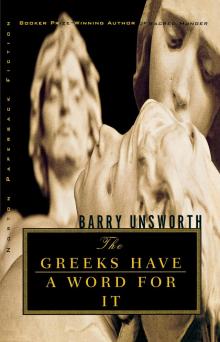 The Greeks Have a Word for It
The Greeks Have a Word for It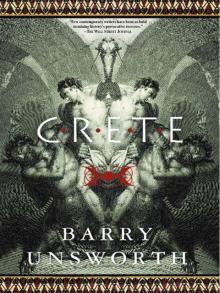 Crete
Crete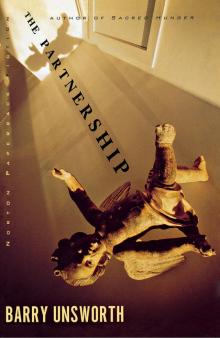 The Partnership
The Partnership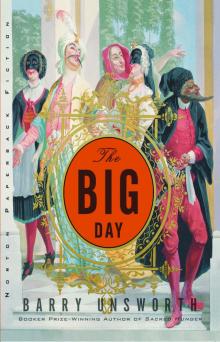 The Big Day
The Big Day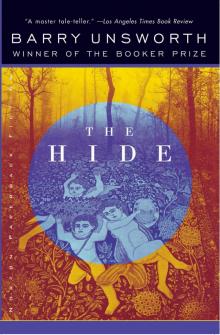 The Hide
The Hide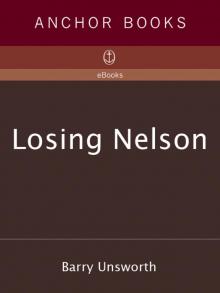 Losing Nelson
Losing Nelson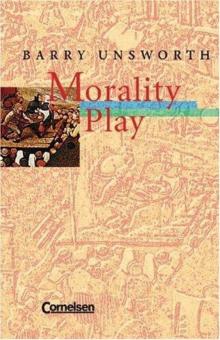 Morality Play
Morality Play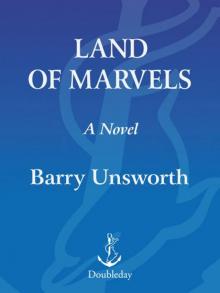 Land of Marvels: A Novel
Land of Marvels: A Novel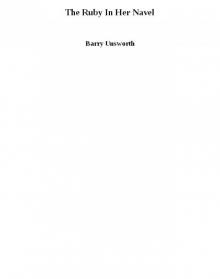 The Ruby In Her Navel
The Ruby In Her Navel